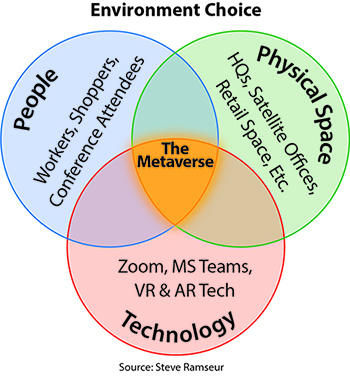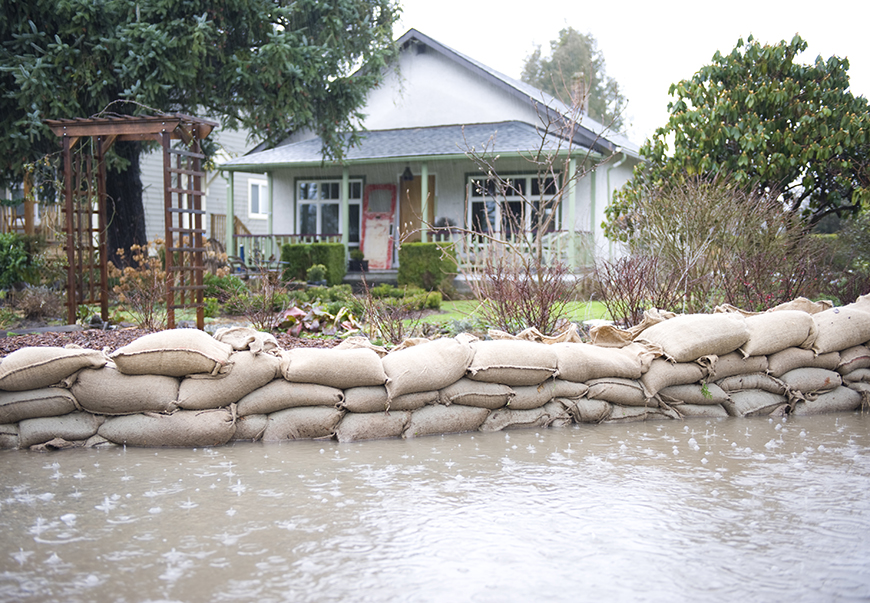
Brave New Virtual World

With work environments rapidly changing, virtual office properties could open a new market for real estate professionals. Virtual reality could make it easier and faster to sell office properties, often before buyers ever step foot in them. |
Everyone from corporate leaders to students on campus are talking about the metaverse. Jamie Dimon and J.P. Morgan are in it. Bob Iger, Disney’s visionary former CEO, is in it. Microsoft spent $70 billion to purchase Activision/Blizzard to gain a foothold in the metaverse. Mark Zuckerberg even changed Facebook’s name to Meta in December.
So what’s all the fuss about? What are they "in"? More importantly, should real estate professionals be in it? If so, is there significant money to be made?
Understanding the Metaverse
How the metaverse will impact bricks-and-mortar values is unknown at this point. How it will impact the value of virtual space is just coming into focus. However, for the average person, the specifics of the metaverse and what it means for their day-to-day lives are largely opaque.
Shortly after Facebook rebranded itself as Meta, highlighting its pivot into the metaverse, the public began picking up on the term. By the spring of 2022, the word was fully adopted into the popular lexicon. In the simplest terms, the metaverse is an upgrade to the Internet. Essentially, the metaverse uses virtual and augmented reality to replicate the feeling of physical space.
Think of the metaverse as an immersive online experience where individuals can interact with colleagues, clients, or other individuals in ways such as grabbing a virtual cup of coffee or making virtual presentations, all in a virtual office environment. If Zoom and Microsoft Teams are the 2-D versions of the future of work, the metaverse will become the 3-D application of it.
Unlike Web 1.0 and 2.0 (the current version of the Internet), Web 3.0 will seamlessly blend all the best aspects of computer gaming and visual entertainment with e-commerce and social media, effectively gamifying the user experience. Visiting a website will go beyond discovering clickable pieces of information to “attending" a cohesive, accessible, and immersive event that puts users inside the virtual environment.
The metaverse will allow the user to superimpose an idealized notion of the world. Individuals can experience a variety of virtual property types, such as office, retail, or even conference space, through idealized and virtually constructed versions of themselves. Barriers to entry are greatly reduced, while metaverse space can be restricted or expanded to suit demand.
Why Should Real Estate Professionals Care?
As discussed in “Flight to Quality: Retaining Talent in the Great Resignation," companies are fighting to retain high-quality talent. In relation to office space, post-pandemic worker preferences revealed that up to 100 percent of a firm’s office employees will no longer be coming into the office five days a week. Employers must create a workplace ecosystem that enables employees to select their preferred work environment based on activities and employee preference. The metaverse adds one more choice at the intersection of where people live, work, and play (see figure).

Imagine a world where corporations have a combination of employees working from home, leased or owned office space, and leased or owned space in the metaverse. Meetings can be scheduled on the employee’s preferred platform, whether it be through software applications such as Microsoft Teams or Zoom, at their physical office, or in the metaverse. Such a varied strategy, while helping to control costs, will empower self-management, which has proven to be essential for employee satisfaction.
Work that facilitates connection and a sense of belonging, while providing workers with purpose and meaning, will impact an employee’s decision to remain or leave a given job. A real estate strategy at the intersection of the built and digital environment that offers choice at the lowest possible cost can contribute to these basic human needs. The metaverse will provide users with a simple plan: added convenience and value.
The greatest appeal to the average consumer or worker is convenience. Some employees will commit to remaining in the office, others will elect to become digital nomads, and still others will work a hybrid of the two. Those working from home may want to incorporate metaverse activity into their week to allow for some social interaction, even if only virtual.
The ability to trade digital space and generate real estate revenues from digital space will also appeal to firms. While companies want to put their best foot forward, they will ultimately consider the cost savings when their best foot forward becomes too expensive.
Making Money in the Metaverse
Programmers have found new ways to digitize everything from music and correspondence to social interactions. The free market has shown that anything can be monetized.
As these two basic ideas merge, professionals have begun to look for ways to monetize everything digital, including real estate. This is the central premise of the metaverse: any space that people inhabit online can be bought and sold. Unlike the built environment, which is finite, the metaverse has the potential to become a much larger market. This means more potential sales revenue for real estate professionals.
Another way the metaverse can assist real estate professionals is by providing a listing platform where potential buyers and tenants can explore real property virtually from an immersive, realistic perspective.
The easiest way to guarantee a property trades is to increase the number of eyes on the property. However, showing a property in person has its limitations. Posting the listing online is a 2-D experience, and there are only so many hours in the day to show a property in person.
The metaverse fills the gap between time constraints and the utility of an online listing. By viewing ultra-high-quality 3-D renderings of a given property, potential clients can get a feel for the property before they ever set foot across the threshold. Dozens of clients could walk the space simultaneously from their offices, allowing them to determine just how interested they are before they ever pick up the phone. With 5G network capabilities, the difference between experiencing the property in person and experiencing it through the metaverse will be negligible.
Brokers can profit from helping companies retain talent through the metaverse by doing what brokers do best: creating connections and building relationships. Trading virtual real estate will be entirely about levering relationships. The metaverse will help employers retain high value talent by offering workers more opportunities to connect.
Metaverse Service Companies are Emerging
Companies that are buying and building in the metaverse are actively seeking more opportunities than they have time to find and vet. The largest participants currently exploring the metaverse are technology and finance-related firms with limited access to real estate expertise. If brokers want to capture the fees associated with these transactions, they will need to know what spaces are available, who owns them, and what the economics of the space are.
Three companies currently leading the charge in this area are Metaverse Property, SuperWorld, and Swivelmeta. Each of these companies is expanding the footprint of the virtual-built environment. Each one presents brokers with a unique opportunity to profit.
Metaverse Property was one of the first significant real estate companies involved in the metaverse.They describe themselves as a virtual real estate company offering exposure to the burgeoning industry of digital real estate. The company facilitates virtual real estate transactions.
Much like Metaverse Property, SuperWorld virtual real estate allows the public to buy, sell, and trade virtual “plots" of real estate. Each plot measures 100 meters by 100 meters (approximately the size of a school football stadium). The virtual land can be held, sold, or developed. These plots provide the customer with the opportunity to create a built environment with features and vistas completely inaccessible in the real world.
Once owned, the property can be monetized through leasing. Spaces can be leased for such uses as e-commerce, gaming, and advertising. Lease negotiations typically resemble real-world agreements.
More specific uses also exist in the metaverse. SwivelMeta is an Austin-based start-up that has begun to build virtual office space on a build-to-suit basis. Unlike Metaverse Property and SuperWorld, SwivelMeta allows individuals or firms to customize their land and improvements, including the interior space. Corporations and individuals can connect with programmers who implement existing architectural and interior designs or create completely new designs. Many of the spaces will be built on spec and sold or leased between companies and individuals. At this point, most of these transactions are taking place without the assistance of a real estate professional.
How to Get Involved
The first step to getting involved requires finding groups that want to invest in or lease space in the metaverse. Building the right relationships will be critical. Engaging in the metaverse now presents brokers with a “first mover" opportunity. Unlike in existing markets with well-defined commission structures, regulations, and fee pressure, brokers will have the opportunity to set their commissions.
As with every new market opportunity, first movers should expect to capture the majority share of financial gains. While the metaverse is not for everyone, it could be well worth the risk for those willing to take the plunge. The future of the office will inevitably become increasingly virtual as the technology becomes more widely available.
____________________
Dr. Hunt ([email protected]) is a research economist with the Texas Real Estate Research Center; Banks is associate director and executive assistant professor for Texas A&M’s Master of Real Estate program in Mays Business School; and Ramseur is executive professor for Texas A&M’s Master of Real Estate program.

You might also like

Publications
Receive our economic and housing reports and newsletters for free.





